|
|
|
Sort Order |
|
|
|
Items / Page
|
|
|
|
|
|
|
| Srl | Item |
| 1 |
ID:
167667
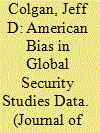

|
|
|
|
|
| Summary/Abstract |
Three major datasets contain problematic interpretative judgments, arguably biased toward the United States: the Polity dataset; Reiter and Stam's data on war outcomes; and Singh and Way's data on nuclear proliferation. These examples raise the possibility that important datasets in global security studies, and in political science more generally, are systematically affected by an American bias. Bias means that, non-Americans might code the same observations differently, on average. The issue arises because Americans, on average, seem to have certain predispositions that non-Americans, on average, do not have. Other nationalities have their own predispositions. I also demonstrate that each of the three empirical examples has significant implications for causal inferences, altering certain statistical findings based upon them. For instance, I reexamine Haber and Menaldo's study of the resource curse, showing that alternative data coding casts substantial doubt on their inferences.
|
|
|
|
|
|
|
|
|
|
|
|
|
|
|
|
| 2 |
ID:
167663
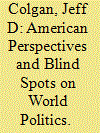

|
|
|
|
|
| Summary/Abstract |
Scholars of international relations (IR) from the United States, like any country, view the world with particular perspectives and beliefs that shape their perceptions, judgments, and worldviews. These perspectives have the potential to affect the answers to a host of important questions—in part by shaping the questions that get asked in the first place. All scholars are potentially affected by national bias, but American bias matters more than others. This special issue focuses on two issues: attention and accuracy in IR research. While previous scholarship has raised principally normative or theoretical concerns about American dominance in IR, our work is heavily empirical and engages directly with the field's mainstream neopositivist approach. The collected articles provide specific, fine-grained examples of how American perspectives matter for IR, using evidence from survey experiments, quantitative datasets, and more. Our evidence suggests that American perspectives, left unexamined, negatively affect our field's research. Still, the essays in this special issue remain bullish about the field's neopositivist project overall. We also offer concrete steps for taking on the problems we identify, and improving our field's scholarship.
|
|
|
|
|
|
|
|
|
|
|
|
|
|
|
|
| 3 |
ID:
134162
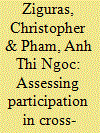

|
|
|
|
|
| Publication |
2014.
|
| Summary/Abstract |
One of the limitations of research on global educational mobility has been the primary classification of key participants - students and educational institutions - in national terms. This paper tests the challenges involved in such methodological nationalism by examining the provision of cross-border education in one city. As Vietnam's commercial centre, Ho Chi Minh City (HCMC) has experienced rapid transformation over the past two decades as the country has moved steadily from a state-directed to a more market-driven and globally integrated economy. Since the late 1990s there has been a parallel growth in cross-border higher education in HCMC, through the outbound mobility of students and the provision of foreign programmes by international partnerships and branch campuses. Drawing on available data supplemented with insights gleaned from interviews and existing literature, this paper develops a methodology for identifying and quantifying the key features of each form of domestic, overseas and transnational provision. We estimate that around 6% of HCMC's tertiary students are studying overseas and between 2% and 3% in foreign programmes delivered in the city. The rates of enrolment in overseas and transnational programmes by students in HCMC are thus far higher than for Vietnam as a whole, but still considerably lower than in those well-established cross-border education hubs, Hong Kong and Singapore. We argue that concerns about the growth of private education and inequalities in access may continue to limit the growth of transnational provision in HCMC.
|
|
|
|
|
|
|
|
|
|
|
|
|
|
|
|
| 4 |
ID:
187513
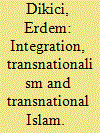

|
|
|
|
|
| Summary/Abstract |
Conventional frameworks of immigrant integration in Western Europe are conceptualised within a nation-state framework of thinking. Transnational ties, relations, activities, and attachments of immigrants as well as transnational state and non-state actors have largely been neglected. This paper introduces/promotes a balanced theoretical approach to study immigrant integration in contemporary Western Europe, namely, integration as a three-way process and negotiation, which takes both national and transnational contexts into account together. To further elaborate on the three-way approach, the paper examines transnational Islam, as a form of transnationalism writ large, which has received enormous negative publicity with a particular emphasis on violent/jihadist networks, and is often conceived as an inhibiter of the Muslim integration. Applied in transnational Islam case, the three-way approach indicates that integration and transnationalism are not necessarily mutually exclusive; transnational Islam and Muslim organisations are diverse, thereby, must be studied as such, and some forms of the latter promote Muslim integration into Western European societies.
|
|
|
|
|
|
|
|
|
|
|
|
|
|
|
|
| 5 |
ID:
192204
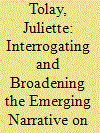

|
|
|
|
|
| Summary/Abstract |
As a promising field of inquiry to understand the nexus between migration and foreign policy, migration diplomacy is rich with studies focusing on the agency of countries in the global South, highlighting the effect of power asymmetries, as well as the existence of a wide range of migration diplomacy practices. This article proposes to take these important contributions even further by opening the field to a wider range of theoretical and epistemological approaches. In particular, this analysis highlights the ahistorical nature and eurocentrism of the field and the extent to which it is based on an unrooted conception of power asymmetries. It also calls for a stronger critique of the field’s focus on material interests, as well as the implicit prioritization of states’ interests. The article encourages further research based on the historical colonial/imperial positionality of different actors to highlight both past and current, visible and invisible practices of migration diplomacy.
|
|
|
|
|
|
|
|
|
|
|
|
|
|
|
|
| 6 |
ID:
094557


|
|
|
|
|
| Publication |
2010.
|
| Summary/Abstract |
The critique of methodological nationalism arose in the 1970s in sociology, but it only gained salience with the rise of globalization theory in the late 1990s. This article argues that in International Relations the discussion of the so-called 'domestic analogy' is closely connected to the one on methodological nationalism as they equally point to the substantive problem of understanding the nation state's position in modernity. The first section of this article revisits the three waves of the debate on methodological nationalism in sociology. The second part connects this with the discussion in IR on the domestic analogy. The last section brings the two disciplinary strands together by suggesting that social theory's claim to universalism is a fundamental resource to theorize current global processes beyond methodological nationalism and the domestic analogy. But for us to do so, we still have to unpack social theory's ambivalent relationship with the natural law tradition.
|
|
|
|
|
|
|
|
|
|
|
|
|
|
|
|
| 7 |
ID:
120138
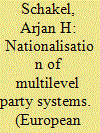

|
|
|
|
|
| Publication |
2013.
|
| Summary/Abstract |
The concept of 'nationalisation' is vigorously discussed in the literature and three dimensions have been proposed. A first dimension considers the extent to which a party's vote in territorial units varies across time and this is labeled 'dynamic nationalisation'. 'Distributional nationalisation' focuses on the degree to which there is an equal distribution of party votes across territorial units. Finally, 'party-linkage nationalisation' concerns the extent to which candidates link together under common party labels. In addition to a conceptual debate there has been a simultaneous debate on the measurement of the various forms of nationalisation. This article contributes to both debates and argues that most of the literature on nationalisation suffers from a methodological nationalism bias - that is, the tendency of many scholars to choose the statewide level and national election as the natural unit of analysis. This claim is supported by a conceptual and empirical analysis regarding the effects of decentralisation on nationalisation. The conceptual analysis shows that the non-robust findings of many studies concerning the effects of decentralisation on nationalisation can be related to the methodological nationalism bias. An effect of decentralisation is found once nationalisation is conceptualised with regard to its multilevel dimension and the measurements of nationalisation are differentiated according to parties, regions and type of elections (national or regional). An empirical analysis on the nationalisation of party systems, parties and regions in 18 countries for national and regional elections held between 1945 and 2009 shows that regional authority has a significant and robust effect on regions and regional elections but not on parties, party systems and national vote shares.
|
|
|
|
|
|
|
|
|
|
|
|
|
|
|
|
| 8 |
ID:
145148


|
|
|
|
|
| Summary/Abstract |
The changing political and social meanings of space under conditions of advanced globalization point to the need to analyze security—or the deployment and management of violence—as a socio-spatial practice. This article draws attention to the “methodological nationalist’ bias that has traditionally characterized mainstream security studies, and discusses its effect on how security issues are studied and conceptualized. Building on insights from political geography and sociology, the article makes the case for a “spatial turn” in the field. It demonstrates how a socio-spatial approach can help make sense of evolving state security practices, and presents examples of non-national spaces of security—including cities, cyberspace, and the global polity. Such spaces are increasingly objects of security practices, although the implications of this remain largely under-theorized in security studies.
|
|
|
|
|
|
|
|
|
|
|
|
|
|
|
|
| 9 |
ID:
155155
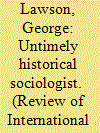

|
|
|
|
|
| Summary/Abstract |
This article examines the historical sociology that informs Andrew Linklater’s Violence and Civilization in the Western States-Systems. On the sociological side, it critically assesses Linklater’s use of Elias and Wight, arguing that his ‘higher level synthesis’ is internally incompatible. On the historical side, the article argues that the occlusion of the transnational interactions that, in great measure, drive historical development means that Linklater’s analysis is inadequate for its stated purpose: to chart the development of civilising processes within the Western state-systems.
|
|
|
|
|
|
|
|
|
|
|
|
|
|
|
|
| 10 |
ID:
111929
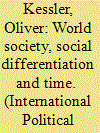

|
|
|
|
|
| Publication |
2012.
|
| Summary/Abstract |
In the current attempt to develop a Global Political Sociology, the concept of functional differentiation increasingly attracts attention. Functional differentiation seems to promise an avenue to describe global processes beyond a methodological nationalism. In this contribution I argue that while we have already made some progress in describing the spatial implications of functional differentiation, less effort has been spent on the temporal side of the story. This contribution highlights this aspect and points to shifting temporalities in the context of finance and international law. This perspective suggests that many "governance problems" might be due to the clash of different temporalities co-existing in world society.
|
|
|
|
|
|
|
|
|
|
|
|
|
|
|
|
|
|
|
|
|